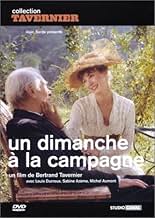IMDb-BEWERTUNG
7,4/10
3363
IHRE BEWERTUNG
Ladmiral erkennt in seiner Tochter Irene, den Menschen welcher er gern geworden wäre.Ladmiral erkennt in seiner Tochter Irene, den Menschen welcher er gern geworden wäre.Ladmiral erkennt in seiner Tochter Irene, den Menschen welcher er gern geworden wäre.
- Regie
- Drehbuch
- Hauptbesetzung
- Nominiert für 1 BAFTA Award
- 13 Gewinne & 12 Nominierungen insgesamt
Sabine Azéma
- Irène
- (as Sabine Azema)
Geneviève Mnich
- Marie-Thérèse
- (as Genevieve Mnich)
Empfohlene Bewertungen
A film that tells a story of a family gathering in a Sunday without not interesting happening had all motives to be boring.
Slow scenes, children running and playing, the grandpa happy for receiving his well behaved and always present son and waiting for the surprise of the sister coming. Will she come? Yes, and not interesting happens except for scenes from real life.
The grandpa puts his granddaughter on the shoulders and gets tired. He complains with the maid for the shoes that were obviously where they were meant to be.
The daughter is independent and unhappy, but can not admit. The son made everything he was supposed to do, is married with children but is sorrow for not being a painter. Why? Because his father is a painter, contemporary of Van Gogh, Monet, Degas and followed his dreams and is much happier than his children. The year is 1905 and the history is so simple that everybody could relate to a passage or another.
Slow scenes, children running and playing, the grandpa happy for receiving his well behaved and always present son and waiting for the surprise of the sister coming. Will she come? Yes, and not interesting happens except for scenes from real life.
The grandpa puts his granddaughter on the shoulders and gets tired. He complains with the maid for the shoes that were obviously where they were meant to be.
The daughter is independent and unhappy, but can not admit. The son made everything he was supposed to do, is married with children but is sorrow for not being a painter. Why? Because his father is a painter, contemporary of Van Gogh, Monet, Degas and followed his dreams and is much happier than his children. The year is 1905 and the history is so simple that everybody could relate to a passage or another.
I saw this film many years ago and loved it and just rewatched it again, this time, on DVD with Bertrand Tavernier's commentary. I must say that I love it now even more. The two words that permeate throughout his film rhythm and time. It is strange to me that he does not say that impressionism was a major inspiration in the work, in fact he says the contrary. Yet I've noticed many films where the director meant to do something only it was taken very differently by the viewers and I guess this was such a case.
Anyway to get back to the film, in hearing Tavernier's commentary, I now realize how musical the whole film is, it's lazy, Sunday tone, then Irene (Azema) coming in like a tornado, then quiet conversations, then someone getting stuck in a tree, then another quiet conversation, then a dance...a series of stop starts that lulls you in its rhythm, but awakens you again with bursts of life and vitality.
In speaking of time and the passage of it, Tavernier encapsulates the life of Mr. Lamiral in one Sunday afternoon, and all the bittersweet sadness, through his relationship with his children, grandchildren, maid and himself through his actions and voiceovers made by an all knowing narrator.
I feel a sense of pride that Tavernier points out in his commentary the poignant scenes which I was so touched by in the first viewing. The scene where Irene tells herself that her niece would die young, the scene where Irene and her father speak of painting, The narrator supplying profound insights on M. Ladmiral about his indifference to his grandchildren. Gonzague's and his wife's decency, but utter clumsiness, living a life bounded by convention and security.
I also learned so much about camera movement through Tavernier. He describes not only the how, but why certain shots are shot they are and you begin to understand why certain scenes provoke certain emotions not only through dialogue and setting, but also how you hear something and see something. One scene where Gonzague and his wife are having an argument and M. Ladmiral comes into the scene but rather than say a word to interrupt, he concludes to himself that it is pointless and leaves the scene without uttering a word. Such a scene tells so much, the relationship of the couple, the father's relationship with the couple, and the father's relationship with himself, all in the frame of a 5 second shot. I'm grateful to M. Tavernier for having created such a beautiful film and added such brilliant insight on the nature of this work.
Anyway to get back to the film, in hearing Tavernier's commentary, I now realize how musical the whole film is, it's lazy, Sunday tone, then Irene (Azema) coming in like a tornado, then quiet conversations, then someone getting stuck in a tree, then another quiet conversation, then a dance...a series of stop starts that lulls you in its rhythm, but awakens you again with bursts of life and vitality.
In speaking of time and the passage of it, Tavernier encapsulates the life of Mr. Lamiral in one Sunday afternoon, and all the bittersweet sadness, through his relationship with his children, grandchildren, maid and himself through his actions and voiceovers made by an all knowing narrator.
I feel a sense of pride that Tavernier points out in his commentary the poignant scenes which I was so touched by in the first viewing. The scene where Irene tells herself that her niece would die young, the scene where Irene and her father speak of painting, The narrator supplying profound insights on M. Ladmiral about his indifference to his grandchildren. Gonzague's and his wife's decency, but utter clumsiness, living a life bounded by convention and security.
I also learned so much about camera movement through Tavernier. He describes not only the how, but why certain shots are shot they are and you begin to understand why certain scenes provoke certain emotions not only through dialogue and setting, but also how you hear something and see something. One scene where Gonzague and his wife are having an argument and M. Ladmiral comes into the scene but rather than say a word to interrupt, he concludes to himself that it is pointless and leaves the scene without uttering a word. Such a scene tells so much, the relationship of the couple, the father's relationship with the couple, and the father's relationship with himself, all in the frame of a 5 second shot. I'm grateful to M. Tavernier for having created such a beautiful film and added such brilliant insight on the nature of this work.
I think this film can be appreciated on several levels. For some viewers, this is just a happy family portrait, reflecting a more peaceful time and recalling one's own memories of family outings and quiet Sunday afternoons. I think this point of view is mistaken, but I can see why people feel this way. The film is externally slow- moving and peaceful, like a sunny river. But like a river, there are strong currents lurking, invisible, under the surface -- currents that cannot be seen, but only observed indirectly from their effects.
There's a lot more going on here than just ninety minutes of bucolic peacefulness. Pay attention to the details, the small looks and gestures, the things said and things left unsaid. You can almost see the fine strands that link the characters, like a spiderweb, where each character's movements are felt by all the others. The role of the narrator, often disparaged in film, is used effectively here, giving the film a somewhat novel-like quality and reminding the viewer of their presence as an observer.
There's more to be said about this film, but I don't feel quite up to it. In any case, the real meaning of the film can't easily be described in words -- which is a good thing, or the film would be unnecessary. So watch the film yourself, if you haven't already, and see what you think.
There's a lot more going on here than just ninety minutes of bucolic peacefulness. Pay attention to the details, the small looks and gestures, the things said and things left unsaid. You can almost see the fine strands that link the characters, like a spiderweb, where each character's movements are felt by all the others. The role of the narrator, often disparaged in film, is used effectively here, giving the film a somewhat novel-like quality and reminding the viewer of their presence as an observer.
There's more to be said about this film, but I don't feel quite up to it. In any case, the real meaning of the film can't easily be described in words -- which is a good thing, or the film would be unnecessary. So watch the film yourself, if you haven't already, and see what you think.
In pre-WWI France Monsieur Ladmiral prepares for the day in his large country house near Paris. It is Sunday, the day his son Gonzague and family frequently visit him. Gonzague arrives by train with his wife and three children - two young sons and a daughter. Monsieur Ladmiral walks to the station to meet them. Well actually he only makes it about half way there when he meets the family walking toward his house. Thus we are introduced to one of the themes - how Ladmiral deals with getting older (in this case by denying that he can't walk as fast as he used to).
On this particular Sunday Ladmiral is also treated to a rare visit by his daughter Irène. She arrives by car and her breezy, outgoing personality dominates. The children take to her, but the reactions of the rest of the family are much more complex. Gonzague has been the dutiful son who has done what was expected of him while Irène is clearly a bit of a free spirit. But equally as clear is that Ladmiral favors his daughter for her determination to live life on her own terms and is disappointed that his son has not been more aggressive.
It is amazing how much we come to understand the dynamics of this family from observing them during this one day. Typical of the hints we get is Gonzague's comment, in response to the excitement over Irène's car, that "I had children and not a car." By the end you feel that you can extrapolate backward in time to the essential history of this family.
Particularly poignant are the musing of the old man himself. He has been a painter of some repute and respect, but feels perhaps that he took too modest a path in his work, that he could have been more experimental and made more significant contributions. Is he wishing that he had been more like Irène than Gonzague, and that is why he fancies his daughter?
The pacing is slow and the filming is lush. You are left with a certain wistfulness. This may evoke memories to visits to your own grandparents.
The focus in on the personalities and the undercurrents of conflicted feelings that exist in all families.
On this particular Sunday Ladmiral is also treated to a rare visit by his daughter Irène. She arrives by car and her breezy, outgoing personality dominates. The children take to her, but the reactions of the rest of the family are much more complex. Gonzague has been the dutiful son who has done what was expected of him while Irène is clearly a bit of a free spirit. But equally as clear is that Ladmiral favors his daughter for her determination to live life on her own terms and is disappointed that his son has not been more aggressive.
It is amazing how much we come to understand the dynamics of this family from observing them during this one day. Typical of the hints we get is Gonzague's comment, in response to the excitement over Irène's car, that "I had children and not a car." By the end you feel that you can extrapolate backward in time to the essential history of this family.
Particularly poignant are the musing of the old man himself. He has been a painter of some repute and respect, but feels perhaps that he took too modest a path in his work, that he could have been more experimental and made more significant contributions. Is he wishing that he had been more like Irène than Gonzague, and that is why he fancies his daughter?
The pacing is slow and the filming is lush. You are left with a certain wistfulness. This may evoke memories to visits to your own grandparents.
The focus in on the personalities and the undercurrents of conflicted feelings that exist in all families.
A lot of people consider it Tavernier's best .
An old man lives in the country in a desirable property.He waits for his children's visit .Whereas his son ,Gonzague,who lives a bourgeois life with wife and kids frequently turns up,his daughter Irene , a socialite ,a woman ahead of her time is often too busy in Paris to remember his old papa.
On a clear sunny day,they all gather in the father's house .Suddenly the house does not look that much cozy.The novel on which the movie is based is called "Mr Ladmiral Va Bientôt Mourir" (M.Ladmiral is soon going to die)and Death shows beneath the placid surface : a terrifying vision of the old man on his death bed -there is a similar scene in John Huston's last work-;a fleeting souvenir of a picnic in the garden where they used to eat (wild?) strawberries;more prosaically,when the family arrives near the church,they can hear "Nearer to thee ,my God" (the Titanic band's canticle!).
The admirable sequence in the Guinguettes displays not only Tavernier's tribute to Auguste Renoir,but also his love for the true masters of the French cinema:Auguste's son Jean ("Une Partie de Campagne") ,Julien Duvivier ("La Belle Equipe") and Jacques Becker ("Casque d'or").
This is a brilliant movie by the man who is perhaps the greatest living French director.His command of the picture is so fascinating that even the frequent voice -overs are not redundant.
Like this?Try these.......
Make way for tomorrow Leo McCarey 1937
Une Partie de Campagne Jean Renoir 1936
Wild Strawberries Ingmar Bergman 1957
Eglantine Jean Claude Brialy 1971
The dead John Huston 1987
An old man lives in the country in a desirable property.He waits for his children's visit .Whereas his son ,Gonzague,who lives a bourgeois life with wife and kids frequently turns up,his daughter Irene , a socialite ,a woman ahead of her time is often too busy in Paris to remember his old papa.
On a clear sunny day,they all gather in the father's house .Suddenly the house does not look that much cozy.The novel on which the movie is based is called "Mr Ladmiral Va Bientôt Mourir" (M.Ladmiral is soon going to die)and Death shows beneath the placid surface : a terrifying vision of the old man on his death bed -there is a similar scene in John Huston's last work-;a fleeting souvenir of a picnic in the garden where they used to eat (wild?) strawberries;more prosaically,when the family arrives near the church,they can hear "Nearer to thee ,my God" (the Titanic band's canticle!).
The admirable sequence in the Guinguettes displays not only Tavernier's tribute to Auguste Renoir,but also his love for the true masters of the French cinema:Auguste's son Jean ("Une Partie de Campagne") ,Julien Duvivier ("La Belle Equipe") and Jacques Becker ("Casque d'or").
This is a brilliant movie by the man who is perhaps the greatest living French director.His command of the picture is so fascinating that even the frequent voice -overs are not redundant.
Like this?Try these.......
Make way for tomorrow Leo McCarey 1937
Une Partie de Campagne Jean Renoir 1936
Wild Strawberries Ingmar Bergman 1957
Eglantine Jean Claude Brialy 1971
The dead John Huston 1987
Wusstest du schon
- WissenswertesThe film is included on Roger Ebert's "Great Movies" list.
- PatzerIrene's flower in her bodice disappears and then reappears.
- SoundtracksQuintette pour piano et cordes Op. 115
Written by Gabriel Fauré
Performed by Le quatuor Via Nova, Jean Hubeau piano solo
Top-Auswahl
Melde dich zum Bewerten an und greife auf die Watchlist für personalisierte Empfehlungen zu.
- How long is A Sunday in the Country?Powered by Alexa
Details
- Erscheinungsdatum
- Herkunftsland
- Sprache
- Auch bekannt als
- A Sunday in the Country
- Drehorte
- Château du Grand Saint-Léger, Villers-en Arthies, Val-d'Oise, Frankreich(house and garden)
- Produktionsfirmen
- Weitere beteiligte Unternehmen bei IMDbPro anzeigen
Box Office
- Bruttoertrag in den USA und Kanada
- 2.411.143 $
- Weltweiter Bruttoertrag
- 2.411.143 $
- Laufzeit1 Stunde 30 Minuten
- Sound-Mix
- Seitenverhältnis
- 1.66 : 1
Zu dieser Seite beitragen
Bearbeitung vorschlagen oder fehlenden Inhalt hinzufügen



























